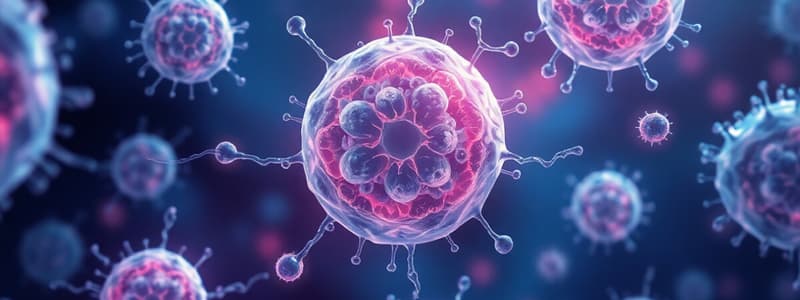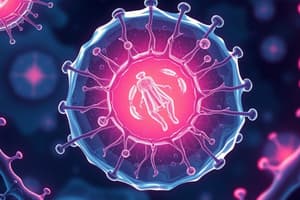Podcast
Questions and Answers
What is differentiation in the context of cell biology?
What is differentiation in the context of cell biology?
Differentiation is the process by which a cell changes to become specialized for its specific job.
How do the structures of sperm cells aid in their function?
How do the structures of sperm cells aid in their function?
Sperm cells have a long tail for swimming and many mitochondria for energy, along with enzymes in the head for penetrating the egg.
Why do mature animal cells have limited ability to differentiate?
Why do mature animal cells have limited ability to differentiate?
Most differentiation occurs during early development, and after specialization, mature animal cells lose this ability.
What characteristic of nerve cells makes them suitable for rapid signaling?
What characteristic of nerve cells makes them suitable for rapid signaling?
Describe one function of muscle cells and a feature that supports it.
Describe one function of muscle cells and a feature that supports it.
How are root hair cells adapted for their function?
How are root hair cells adapted for their function?
What role do phloem cells play in plants?
What role do phloem cells play in plants?
Explain a unique characteristic of xylem cells.
Explain a unique characteristic of xylem cells.
Why can plant cells often continue to differentiate throughout their lives?
Why can plant cells often continue to differentiate throughout their lives?
How does the structure of phloem and xylem cells support their transport functions?
How does the structure of phloem and xylem cells support their transport functions?
Flashcards
Cell Differentiation
Cell Differentiation
The process by which a cell changes to become specialized for its job. It involves developing different subcellular structures to perform specific functions.
Differentiated Cells
Differentiated Cells
Cells that have specialized and lost their ability to differentiate further. This happens early in development for most animals, but not in plants.
Differentiation in Mature Animals
Differentiation in Mature Animals
In mature animals, differentiation is mainly used for repairing and replacing cells in tissues like skin and blood.
Undifferentiated Cells
Undifferentiated Cells
Signup and view all the flashcards
Sperm Cell
Sperm Cell
Signup and view all the flashcards
Nerve Cell (Neuron)
Nerve Cell (Neuron)
Signup and view all the flashcards
Muscle Cell
Muscle Cell
Signup and view all the flashcards
Root Hair Cell
Root Hair Cell
Signup and view all the flashcards
Phloem Cell
Phloem Cell
Signup and view all the flashcards
Xylem Cell
Xylem Cell
Signup and view all the flashcards
Study Notes
Cell Differentiation and Specialisation
- Cells have different structures to perform different functions
- Differentiation is the process where cells change to become specialized
- Specialized cells have specific subcellular structures
- Differentiation allows cells to perform specific functions
- Most animal cells lose their ability to differentiate after becoming specialized
- Plant cells can differentiate throughout their lives
- Specialized cells are important for repair and replacement in mature animals
- Undifferentiated cells are called stem cells
Examples of Specialized Cells
- Sperm cells: Function is to deliver male DNA to female DNA. Features include a long tail for movement, a streamlined head, numerous mitochondria for energy, and enzymes to penetrate the egg
- Nerve cells: Function is rapid signalling throughout the body. Features include their long structure to cover distance, branched connections, and electrical signals
- Muscle cells: Function is rapid contraction. Features include long structure, lots of mitochondria for energy, and ability to contract quickly
- Root hair cells: Function is absorbing water and minerals from the soil. Features include long hairs that increase surface area for absorption
- Phloem and xylem cells: Function is transporting substances around plants. Features include hollow xylem cells for efficient transport of water and phloem cells with few structures allowing for flow
Studying That Suits You
Use AI to generate personalized quizzes and flashcards to suit your learning preferences.




